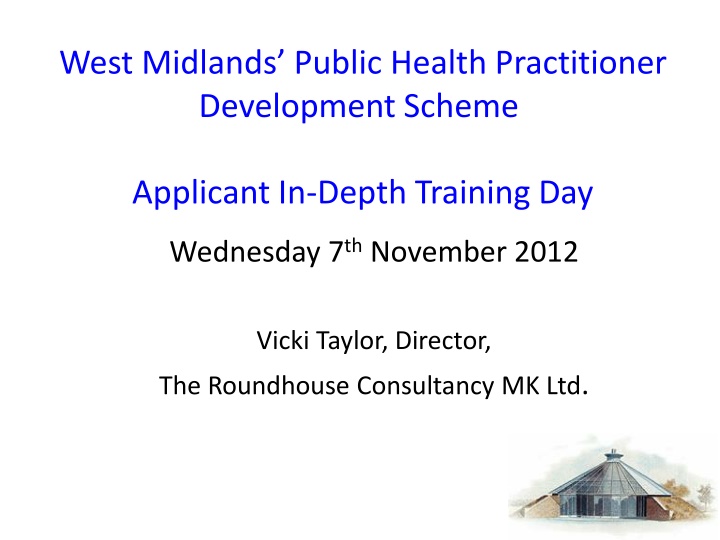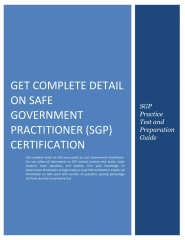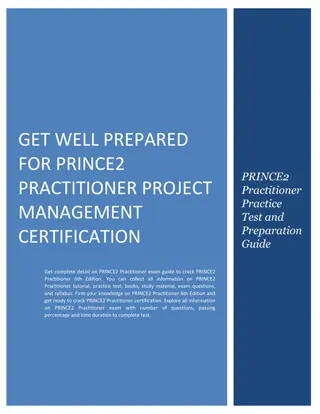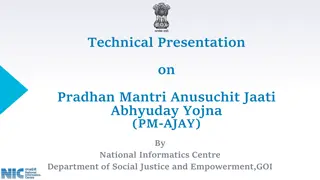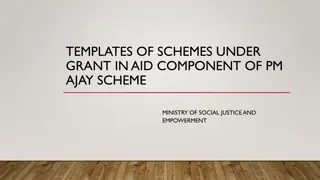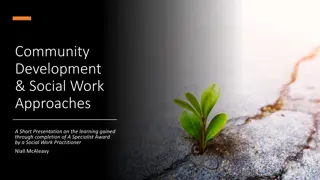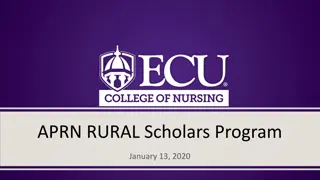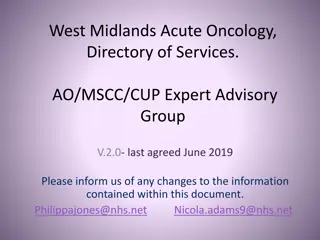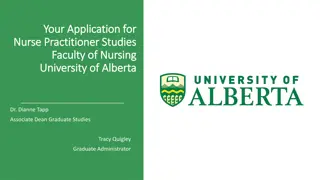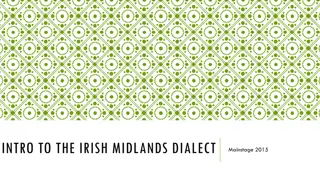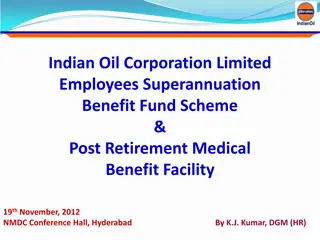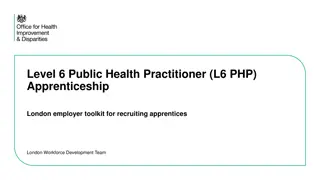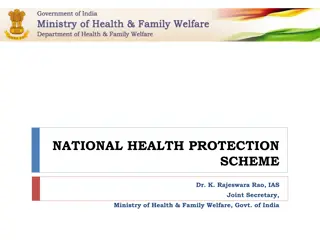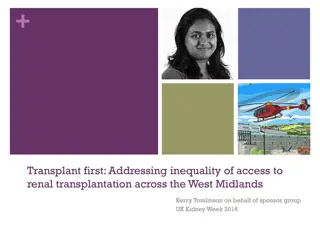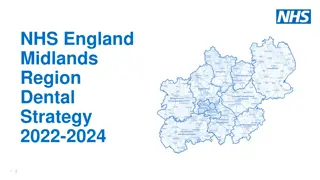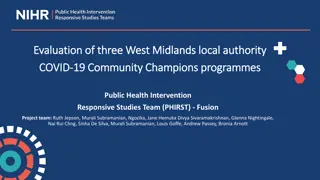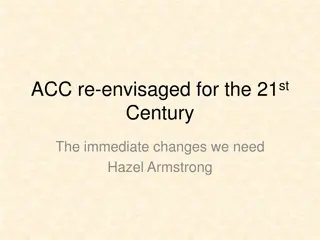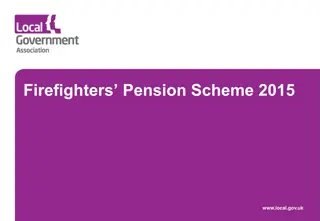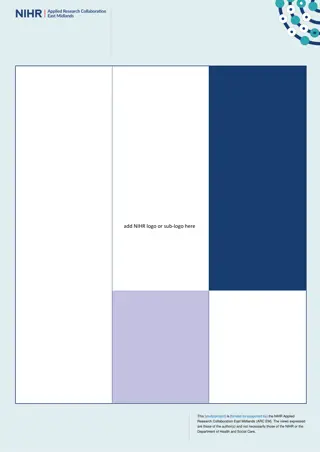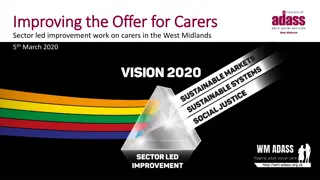West Midlands Public Health Practitioner Development Scheme Overview
Review the 12 standards for public health practitioner competence, covering professional ethics, technical competencies, collaborative working, and underpinning skills. Understand the application process, guidance documents, and assessment criteria for the scheme.
Download Presentation

Please find below an Image/Link to download the presentation.
The content on the website is provided AS IS for your information and personal use only. It may not be sold, licensed, or shared on other websites without obtaining consent from the author.If you encounter any issues during the download, it is possible that the publisher has removed the file from their server.
You are allowed to download the files provided on this website for personal or commercial use, subject to the condition that they are used lawfully. All files are the property of their respective owners.
The content on the website is provided AS IS for your information and personal use only. It may not be sold, licensed, or shared on other websites without obtaining consent from the author.
E N D
Presentation Transcript
West Midlands Public Health Practitioner Development Scheme Applicant In-Depth Training Day Wednesday 7thNovember 2012 Vicki Taylor, Director, The Roundhouse Consultancy MK Ltd.
1. Review of standards What is evidence? Types of evidence
The Public Health Practitioner Standards Application of PH competence Four key areas 12 standards Technical competence Professional & ethical practice Underpinning skills & knowledge Each standard described by indicators of effective practice 42 altogether (plus 7 sub-indicators) Standards cover knowledge, understanding & practice
Summary of the 12 standards Standards 1-4: professional and ethical practice Recognising and addressing ethical dilemmas and issues Acting within limits of own competence, seeking advice Acting in ways that promote equality and diversity etc Developing and improving own and others practice Standards 5-8: Technical competencies in public health practice Health and well-being and reduction of health inequalities Dealing appropriately with data and information Assessing evidence of effectiveness Identifying risks to health and wellbeing
Summary of standards contd. Standard 9: Application of the technical competencies Working collaboratively on programmes to improve health and wellbeing outcomes that demonstrate the technical competencies See notes - need not be work you have personally led but demonstrate understanding of how programme developed Standards 10-12: Underpinning skills and knowledge Public health policies and strategies Working in teams, relationships, partnership working Note difference between standard 9 and standard 11 Effective communications
The UKPHR guidance documents Framework and Guidance document Main document how the scheme works for applicants, assessors and verifiers Standards and processes Supporting Information document Standards - Examples and explanatory notes Glossary indication of expected knowledge standards 5 8 especially Assessment log Observation proformas Application forms for verification and registration Guidance on testimonials and references
What evidence do you have? Group work Look at standard 5 Think about what evidence you have for this standard remember to look at all the indicators Share and discuss in your group What would be important to include in your commentary about this evidence?
2. The assessment process The assessment log, clarifications, resubmissions & verification, relationship with assessor and mentor
Relationship with assessor Do not have to submit all evidence to Assessor at the same time Recommend formal agreement between practitioner and assessor on communication Estimated number of commentaries + evidence Dates for submission of commentaries Turnaround time for assessor feedback Preferred contact method(s) etc.
Assessor and Mentor boundary Mentor Assessor Agrees assessment contract Assesses evidence Completes assessment log Feeds back outcome Should not provide guidance and input to draft commentaries Facilitates process of self directed learning Gives advice on self assessment against standards Is not carrying out an assessment
Assessment log An important open document between applicant and assessor and provides full audit trail You, the applicant, must list the title(s) of your evidence against each sub-section of the standard Adequate, clarification, resubmission and assessor comment on why evidence meets the standard
Clarifications and resubmissions Clarification Assessor believes there is evidence to meet standard but more detail/ clarity needed Usually submitted within one/two months of request* Resubmission Assessor believes evidence is inadequate & new evidence needed Usually submitted within 3/6 months of request* *= Decided locally If resubmission/clarifications needed for more than half of evidence, applicant may need further training
Types of evidence Different types of evidence Written reports from work setting; write-up of case studies or observation of colleagues Videos, DVDs with accompanying commentary Observation possible for standards 11 and 12 (observation proformas provided) Detailed testimonials with accompanying commentary Could be from other settings, e.g. voluntary work Knowledge and understanding and application of knowledge in evidence
Amount and currency of evidence Minimum of 3 discrete piece of shows work, supported by knowledge statements At least 2 pieces of work across areas 5-8 (PH technical areas) Half of the evidence should be from past 3 years (at time of applic. for Registration) 1 box file of evidence, or electronic equivalent Data confidentiality
Outcomes of assessment Nearly always, assessor will be confident that all the standards have been met and that applicant implements the ethical framework Very occasionally Assessor may still have concerns which the applicant accepts. Bank competencies and resubmit entire portfolio at a later date. Further learning and development Assessor may still have concerns which applicant does not accept. Go to verification stage.
Verification process Verifiers are registered public health specialists (GMC, GDC, UKPHR) with at least 3 years at consultant level Check that the assessment has been carried out appropriately independent scrutiny (QA role) Verification is not a second assessment Verifiers meet as the Surrey Sussex Verification Panel The Panel may interview applicants and assessors Verification Panel decision is final (apart from moderation processes and formal appeals)
Registration procedure After meeting of verification panel, applicant must apply within 3 months to UKPHR for registration See section 5 of main guidance document Application form is in Supporting Information document; plus CV, testimonial, reference Fee 20 admin fee + 75 subscription fee Application considered by UKPHR Registration Panel Registration valid for 5 years CPD the basis of demonstrating fitness to practice
Outline of the process 1 Assessor Applicant Assessment Log 2 6 Scheme Co-ordinator 3 Verifier 4 UKPHR Verification Panel 5 7 Registration Panel Admitted to register
Assessors Assessors need not be registered public health professionals but will have sound knowledge of public health Will be appointed by NHS Midlands and East following successful completion of UKPHR training Will be allocated to practitioners by Scheme Co- ordinator Relationship with the applicant agreement on communication Assessor-mentor boundary Guidance doc Annex 4
3. Reflective writing, writing a commentary and putting a portfolio together
What is a portfolio? Provides evidence of your competence against 12 standards All portfolios are unique Explicit and systematic presentation of evidence in a commentary Will include some reflective writing demonstrating practical application of theory and learning from this
Commentaries Signpost the assessor to the supporting evidence Set out context and role of applicant How knowledge acquired Understanding and application of knowledge How the evidence demonstrates the particular standard, relating directly to the wording in each sub-section of the standard A reflection on learning from the work
Commentaries Evidence for each standard needs to be accompanied by a commentary to give background information and help the assessor to make sound judgements on your evidence. A commentary might contain information on: The context for the work Your own role in the work How you acquired the knowledge to support the work Your understanding of the issues, gained from your learning How you have applied that knowledge in this piece of work Precisely how you believe the evidence demonstrates the particular standard, relating directly to the wording in each sub-section of the standard A reflection on your learning from this work, what went well, what you would do differently
Writing a commentary Group exercise think about what you would need to include in a commentary prepare a flipchart with key headings once you have agreed these
Writing a commentary Some suggestions for key areas to cover: Title - basic description of subject of summary Competencies/standards claimed Context Methodology/approach The project/what you did, why, how, what went well less well etc. Outcomes &Impact Reflection List of supporting evidence
Reflective writing Should help to demonstrate what was learnt from doing the work, your role, and what you might do differently if you were to do a similar piece of work in the future Should demonstrate critical analysis of your own practice Look at how the work could be improved, what you would do differently and why, what was learnt, and how you have applied this subsequently
Why reflection? There is an expectation that practitioners reflect on what is currently being done and why and improves/changes practice as a result. Relates theory to practice - reflection is one of the most important factors in achieving this synthesis. Unless this link is made then knowledge is of little practical value.
Some models Kolb and Fry - experiential learning cycle Gibbs - reflective cycle Johns - reflective practice Boud, Keogh & Walker - model of reflection
Reflective writing What did I do? What lessons have I learnt? What challenges did I face and how did I address these? What would I do differently in the future, and why? How have I applied my learning from this experience? Where am I now and what do I need to do next?
Reflective learning is a process of internally examining and exploring an issue of concern, triggered by an experience, which creates and clarifies meaning in terms of self, and which results in a changed conceptual perspective. Reflection on action requires: Thinking about current practice Questioning whether it is the best method of handling the problem Enquiring whether other practitioners use similar approaches
Some useful references Boud, Keogh and Walker (2000) Reflection: Turning Learning into Experience Kogan Page, London. Bulman, C. and Schutz, S. (Eds) (2004) Reflective Practice in Nursing, third edition, Blackwell Publishing, Oxford. Gibbs G. (1988) Learning by Doing: A guide to teachig and learning methods, Further Education Unit, University of Oxford, Oxford. Holm and S. Stephenson. Reflection-A Student's Perspective in Palmer A, Burns S, Bulman C (1994) Reflective Practice in Nursing: The Growth of the Reflective Practitioner, Blackwell Scientific, London.
Johns, C. (2005) Transforming Nursing Through Reflective Practice, second edition, Blackwell Publishing, Oxford. Knowles, M (1980) The Modern Practice of Adult Education, Englewood Cliffs, NJ Cambridge Adult Education. Kolb, D.A. and Fry, R. (1975) 'Towards an applied theory of experiential learning' in Cooper, C.L (ed) Theories of Group Processes, London, John Wiley, pp. 33-57 Schon, D. (1983) The reflective practitioner: how professionals think in action, Basic Books, University of Michigan.
